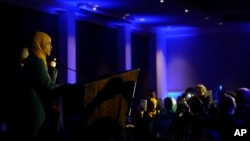At least eight Somali American women won races in Tuesday's U.S. midterm elections, results show.
Ilhan Omar, the most prominent Somali American politician, held on to her U.S. House of Representatives seat in Minnesota's 5th Congressional District. This will be the third term for Omar, who was first elected in 2018.
In Minnesota state races, Zaynab Mohamed was elected to the Senate, becoming the first woman of Somali descent elected to the chamber, according to MPR News. Meanwhile, Hodan Hassan defended her seat in the state House of Representatives.
Other Somali American women running for offices in Minnesota were victorious, including Fathia Feerayarre, who won a seat on the Minneapolis Public Schools board.
In neighboring North Dakota, Hamida Dakane also made history, becoming the first woman of Somali descent elected to the state House. Born in northeastern Kenya's Somali region, Dakane, who won Fargo's District 10, came to the U.S. in 2011.
In Maine, Deqa Dhalac, who made history last year as the first Somali American mayor for a U.S. city, South Portland, has now been elected to the state House after handily defeating Republican opponent Michael Dougherty. Mana Abdi, who was running unopposed for a seat representing Lewiston, Maine, joins her in the House.
In Ohio, Munira Abdullahi and Ismail Mohamed, a man, won seats in the state House. Minnesota and Ohio have among the largest Somali American populations in the U.S.
Speaking to her supporters Tuesday night, Omar highlighted the significance of victories achieved by Somali American women.
"There was a time when we believed that women with a hijab could not get elected," she said. "Tonight, Minnesota is electing three new women who are wearing hijab. That shows if you trust in yourself, if your people trust you, stand with you, everything is possible."
Mohamed, one of the hijab-wearing Minnesota winners, expressed hope that more Somali Americans will run for office.
"I'm very happy with this victory tonight, thank God," she told VOA Somali. "This is a victory for me, for my family and for the Somali people. God willing, a lot of men and women will follow me and will come through."
Shukri Olow, who lost a state House seat outside Seattle, Washington, told VOA Somali that she was inspired to run by the women before her, including Omar, Hassan and Dhalac.
In an interview with VOA Somali, Dhalac confirmed that when she visited Washington in 2018, Olow asked her questions about running for office.
"She said she wanted to run for the open seats in her area or seats that will be open in the future in Washington state," Dhalac recounted. "I encouraged her to do it. Many women say we will do this, we will do this tomorrow, we will do this next year. I said to her, if you want to compete, just do it."
The success of Somali American female candidates in the U.S. eclipses that of female aspirants for elected office in Somalia.
Female politicians in Somalia are so disenfranchised that in 2016, Somalia's federal and regional leaders had to start allocating a specific quota of seats in parliament. But women still were never given the opportunity to get the 30% quota promised.
In 2016, Somali women occupied 24% of the 329 seats in the two houses of parliament. In 2022, female candidates secured only 20%, well short of the 30% quota.
Fawzia Yusuf Haji Adam, the only female presidential candidate in the May 15 presidential election, got just a single vote — her own.
"I did not get the support I'm sure [Somali American women] are getting when they stand [for office], because here the culture and other factors are causing a lack of encouragement [for women]," she said.
Adam welcomed the success of Somali American women.
"This is a victory for Somali women in the diaspora," she said. "I congratulate them, I encourage them, and we are proud of them."
She said women in the diaspora, including those in the United States, Europe, and Canada, have opportunities that women in Somalia do not have.
"What made it possible is, first, the places they live in, where men and women are viewed equally, where they get encouragement from the schools, from the university, and from the parents, and they can see achievements by other women," she said.
"Over there, the neighborhood they live in is going to elect them when they see the person is trustworthy, honest, working and clean. White and Black would vote for that."
Harun Maruf contributed reporting from Washington.




